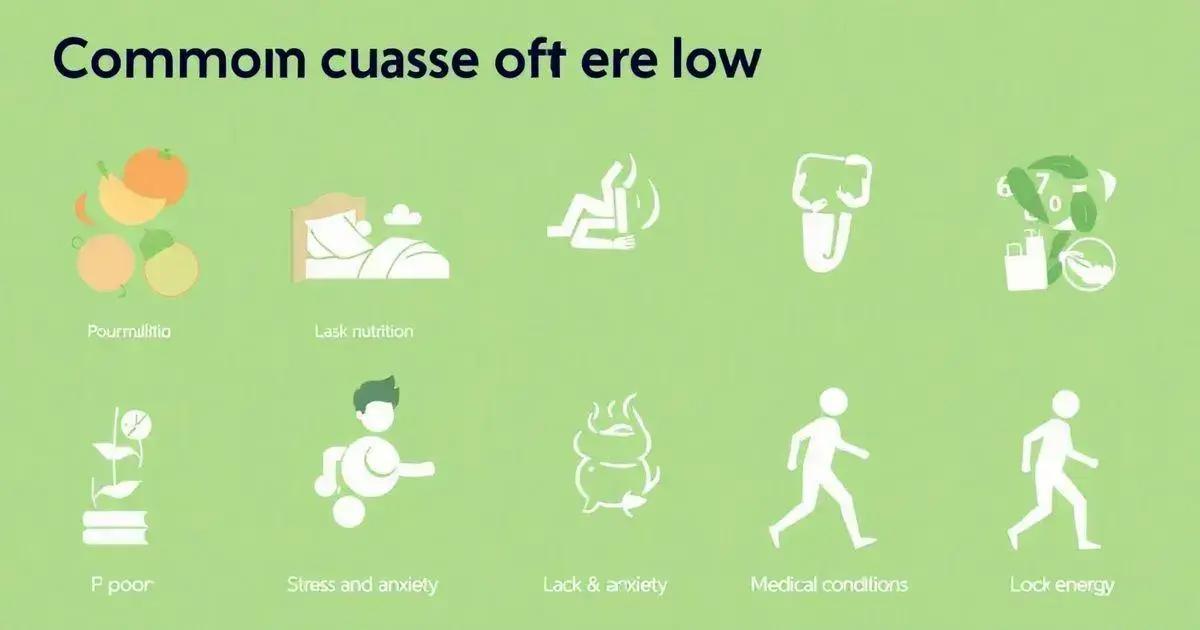Seeking to address and manage low energy levels effectively involves understanding common causes such as poor nutrition, lack of sleep, and stress, while implementing practical tips like staying hydrated, exercising, and maintaining a balanced diet. Recognizing when to seek professional help is also crucial for overall well-being.
Low energy levels can significantly impact your daily life, affecting your productivity and emotional well-being. Understanding how to address and manage low energy levels is crucial for regaining vitality. In this article, we will explore the common causes of fatigue, practical tips to boost your energy, and when to seek professional help. Let’s dive into strategies that can help you feel more energized and engaged in your daily activities.
Understanding Low Energy Levels

Understanding low energy levels is essential for improving your overall well-being. Low energy can feel like a heavy weight, making it difficult to complete daily tasks. Many people experience these feelings, and recognizing the signs can help you take action.
What Are Low Energy Levels?
Low energy levels often manifest as fatigue, lethargy, or tiredness. You may find it hard to concentrate, stay focused, or even get out of bed. This can affect your work, relationships, and daily routines.
Why Do We Experience Low Energy?
There are several reasons for low energy levels. Physical, emotional, and environmental factors can play a vital role in how energized you feel.
Physical Factors
Lack of sleep is one of the most common contributors to low energy. Adults should aim for 7-9 hours of sleep each night. Poor nutrition also impacts energy; a diet low in essential nutrients may lead to fatigue.
Emotional Factors
Your mental health significantly affects your energy. Stress and anxiety can drain your energy. Feeling overwhelmed can make even small tasks seem daunting.
Environmental Factors
The environment around you can impact your energy levels. Insufficient natural light or poor air quality can lead to feelings of tiredness. Moreover, sedentary lifestyles can also contribute to low energy.
Overall, identifying the causes of your low energy levels is the first step toward managing and improving them.
Common Causes of Low Energy

Several common causes contribute to low energy levels. Understanding these factors can help you address them effectively.
Poor Nutrition
What you eat plays a crucial role in your energy levels. A diet high in sugars and processed foods can lead to sudden spikes and drops in energy. On the other hand, incorporating fruits, vegetables, whole grains, and lean proteins can provide the sustained energy you need.
Lack of Sleep
Sleep deprivation is a significant factor leading to low energy. Not getting enough restful sleep can lead to tiredness during the day. Aim for 7-9 hours of sleep each night to feel refreshed.
Stress and Anxiety
Mental health is essential for maintaining energy. Continuous stress and anxiety can be draining. Finding ways to manage stress through relaxation techniques or hobbies can boost your energy levels.
Medical Conditions
Sometimes, low energy can be traced back to underlying medical conditions. Conditions like anemia, hypothyroidism, or chronic fatigue syndrome can lead to persistent fatigue. It’s essential to consult a healthcare provider if you frequently experience low energy.
Lack of Physical Activity
Being inactive can also contribute to low energy. Regular physical activity helps increase blood flow and oxygen to your body, leading to improved energy levels. Aim for at least 30 minutes of moderate exercise most days of the week.
Identifying these common causes is a critical step in learning how to address and manage low energy levels effectively.
Practical Tips to Boost Energy

Boosting your energy levels is essential for staying active and productive. Here are some practical tips to help you feel more energized throughout the day.
Stay Hydrated
Water is crucial for maintaining energy. Dehydration can lead to fatigue and decreased concentration. Aim to drink at least 8 cups of water each day. You can also consume fruits and vegetables with high water content to stay hydrated.
Eat Balanced Meals
Focus on nutritious foods that provide lasting energy. Include complex carbohydrates, proteins, and healthy fats in your meals. For example, oatmeal, nuts, and lean meats can help maintain energy levels.
Take Short Breaks
Taking short breaks during work can refresh your mind and body. Stand up, stretch, or take a brief walk. Just a few minutes can make a significant difference in your focus and energy levels.
Incorporate Physical Activity
Regular physical activity is vital for boosting energy. Engage in activities like walking, jogging, or yoga. Aim for at least 30 minutes of exercise per day to improve circulation and release endorphins, which can increase your energy.
Establish a Routine Sleep Schedule
Maintain a consistent sleep schedule by going to bed and waking up at the same time every day. Good sleep hygiene can help ensure you wake up refreshed and ready to tackle the day.
Practice Mindfulness Techniques
Techniques like meditation and deep breathing can reduce stress and increase your energy. Make a habit of taking a few minutes each day to practice mindfulness or relaxation exercises.
Implementing these practical tips can help you manage and boost your energy levels effectively.
When to Seek Professional Help

Knowing when to seek professional help for low energy levels is essential for your health. Here are some signs that indicate it’s time to consult a healthcare provider.
Persistent Fatigue
If you experience chronic fatigue that lasts for more than a few weeks, it might be time to seek help. Fatigue that doesn’t improve with rest can be a sign of underlying health issues.
Severe Sleep Issues
Having trouble sleeping or consistently waking up feeling tired is another indication. If sleep disorders are affecting your energy, professional guidance can help you find effective solutions.
Feeling of Hopelessness
If you notice feelings of sadness, hopelessness, or lack of interest in activities you once enjoyed, it may indicate a mental health issue. A mental health professional can provide support and therapies.
Significant Weight Changes
Unexpected weight loss or gain can affect your energy levels. If you experience significant changes in your weight without making lifestyle changes, consult a doctor.
Physical Symptoms
Physical symptoms like unexplained pain, headaches, or digestive issues combined with low energy may need medical attention. Persistent symptoms should not be ignored.
Family History of Health Issues
If you have a family history of health problems that can cause fatigue, such as thyroid issues or anemia, it’s wise to talk to a healthcare provider about your energy levels.
Seeking help from professionals can guide you in understanding and managing your low energy levels effectively.
Taking Charge of Your Energy Levels
Managing low energy levels is essential for leading a fulfilling and productive life. By understanding the common causes of fatigue, individuals can adopt practical tips to boost their energy. Staying hydrated, eating nutritious meals, incorporating physical activity, and establishing healthy sleep habits are key strategies.
However, it’s crucial to recognize when professional help is needed. Persistent fatigue, severe sleep issues, or mental health concerns require attention from healthcare professionals. Seeking help can provide valuable insights and support for your well-being.
When you take proactive steps, you can successfully address and manage low energy levels, paving the way for a more energetic and engaged life.
FAQ – Frequently Asked Questions about Managing Low Energy Levels
What are common causes of low energy levels?
Common causes of low energy levels include poor nutrition, lack of sleep, stress and anxiety, medical conditions, and inactivity.
How can I boost my energy levels effectively?
You can boost your energy levels by staying hydrated, eating balanced meals, taking short breaks, exercising regularly, and establishing a consistent sleep schedule.
When should I seek professional help for low energy?
You should seek professional help if you experience persistent fatigue, severe sleep issues, feelings of hopelessness, significant weight changes, or unexplained physical symptoms.
How does hydration affect energy levels?
Staying hydrated is crucial for maintaining energy, as dehydration can lead to fatigue and decreased concentration. Aim for at least 8 cups of water a day.
What role does nutrition play in energy management?
Proper nutrition provides the necessary nutrients for sustained energy. A balanced diet rich in complex carbohydrates, proteins, and healthy fats helps maintain energy levels.
Can stress management techniques improve my energy?
Yes, practicing stress management techniques such as mindfulness, meditation, and deep breathing can significantly improve your energy levels.













